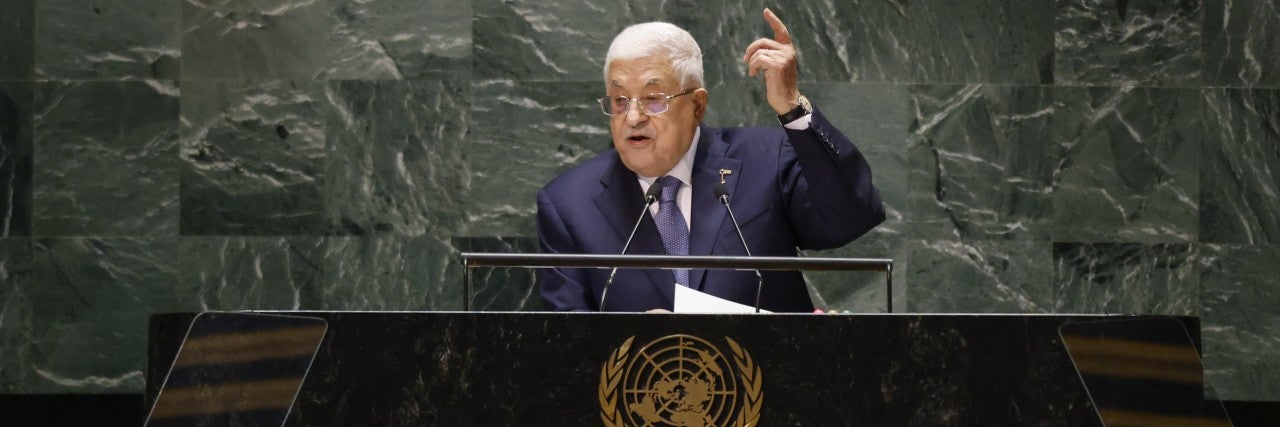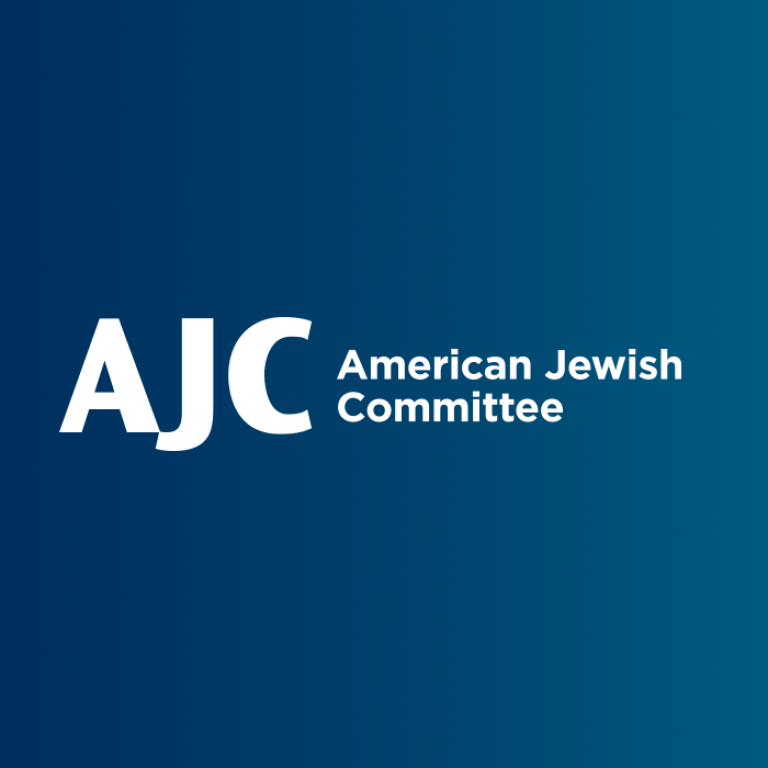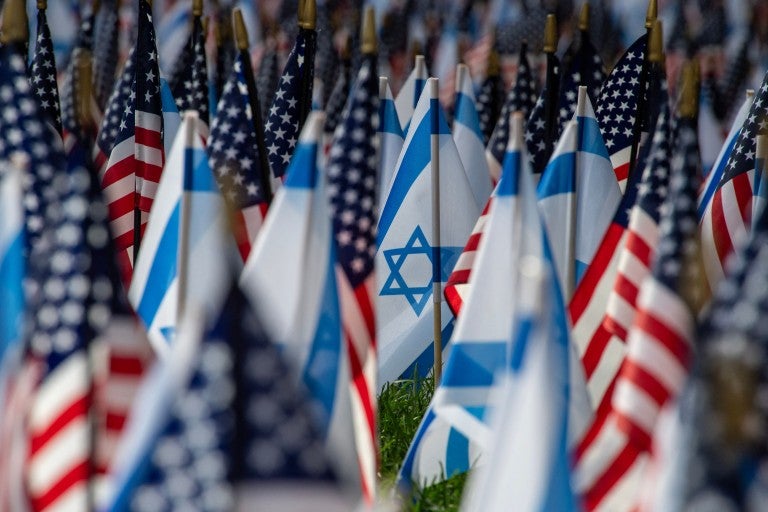May 10, 2024
Amid the ongoing Israel-Hamas war, rocket attacks from Hezbollah in Israel’s north, and the Iranian regime's drone and missile attacks on Israel, the Palestinian Authority is attempting to circumvent the Israeli-Palestinian peace process and unilaterally gain admission to the United Nations as a member state.
On April 18, a resolution in the UN Security Council (UNSC) was rejected after the United States, one of the five permanent members of the UNSC, vetoed it.
Update: Following the veto at the Security Council, on May 10, the UN General Assembly passed a resolution supporting a Palestinian bid to become a full UN member state. The resolution "determines that the State of Palestine ... should therefore be admitted to membership," and it "recommends that the Security Council reconsider the matter favorably." However, while UN membership can only be approved by the Security Council, which the U.S. had previously vetoed, the UNGA resolution did grant some additional rights and privileges, such as a seat among UN members in the assembly hall.
Here’s what to know about the Palestinians' status at the UN, how states are admitted, and five reasons why unilateral Palestinian efforts are problematic for peace.
What is the process for becoming a UN member state and what are the Palestinians attempting to do?
For a state to become a member of the United Stations, it must submit a formal application. The UNSC reviews the application and decides whether to recommend the candidate’s admission to the UN.
The Security Council's recommendation requires at least nine affirmative votes, with no veto from any of the five permanent members. Once recommended, the UNGA votes on the UNSC’s recommendation. Admission requires a two-state majority at the UNGA. If approved, the state becomes a full member of the United Nations.
In 2011, the Palestinians applied for full membership but failed to receive the nine affirmative votes in the UNSC needed to advance the application.
Get AJC's Daily Israel Update
On April 2, the Palestinian observer to the UN sent a letter to the UN Secretary-General requesting that the UNSC resume consideration of the Palestinian application for UN membership from September 2011.
On April 18, UNSC member Algeria put forward a draft resolution to admit the Palestinians as a member state of the UN, at a ministerial-level meeting on the Middle East.
Twelve countries voted in favor of the resolution, exceeding the nine required to force a U.S. veto. The countries that supported the measure were Slovenia, Sierra Leone, Russia, South Korea, Mozambique, Malta, Japan, Guyana, France, Ecuador, China, and Algeria. The U.K. and Switzerland abstained.
AJC welcomed the U.S. veto, saying that "Palestinian statehood is something that must come through direct negotiations between the two parties, not by unilateral actions that bypass the peace process."
What is the current status of the Palestinians at the UN?
Palestine is a non-member observer state in the United Nations. It gained this status on November 29, 2012, when the UN General Assembly (UNGA) voted to upgrade Palestine's status from “observer organization” to "non-member observer state."
Non-member observer states at the UN enjoy many of the privileges and rights of member states, such as attending meetings and contributing to discussions. However, they are denied fundamental rights reserved only for member states, including the right to vote, the right to present candidacy to UN bodies, and the right to bring a case to the International Court of Justice.
Does the Palestinian Authority meet the UN requirements for statehood?
The Palestinian Authority does not satisfy the traditional criteria for statehood, including control over defined territory, a permanent population, and an effective government.
The Israel-Hamas war underscores that the Palestinian Authority does not control the Gaza Strip.
However, this area is part of the purported Palestinian state that was designated under the 1993 Oslo Accords. The Palestinian Authority's inability to rein in Hamas and other terror groups violates a fundamental attribute of statehood, which is a monopoly over the use of force.
Why is unilateral recognition of Palestinian statehood harmful to peace?
First, a UN endorsement of a unilaterally declared Palestinian state at this time, after Hamas’ massacre of more than 1,200 Israelis on October 7, would be perceived as a huge victory for this Iran-backed terrorist organization, sending a signal to militant extremists and belligerent states around the world to follow suit.
AJC Op-Ed by Aaron Jacob in the Times of Israel
Second, recognition of such a state and its admission to the UN will undermine any efforts to resume negotiations between Israelis and Palestinians. It will reward Palestinians who believe they can rely solely on international pressure on Israel rather than make the necessary compromises for peace.
Third, the Palestinian Authority does not satisfy the traditional criteria for statehood, including control over defined territory, a permanent population, and an effective government. The war between Israel and Hamas underscores that the Palestinian Authority does not control the Gaza Strip, although Gaza is considered part of the purported Palestinian state. The PA’s inability to rein in Hamas violates a fundamental attribute of any effective government: monopoly over the use of force. Likewise, with some Palestinian voices accepting two states whose territorial boundaries will be negotiated with Israel, others declare that all of the land between the river and the sea is Palestine.
Fourth, unilateral Palestinian attempts to acquire attributes of statehood outside the negotiating process violate existing Israeli-Palestinian agreements, which clearly state that permanent status issues are subject to agreement between the parties. These same agreements are the legal basis for the existence of the Palestinian Authority. Seemingly, undermining the contours of those agreements will dissolve the PA.
Fifth, only through direct negotiations with Israel can the Palestinians fully realize their national aspirations. Any attempted shortcut, either at the UN or elsewhere, will only delay a solution, thus unnecessarily prolonging the suffering of both Israelis and Palestinians.
What is AJC’s stance on Palestinian statehood?
AJC has long held that a durable two-state solution is the only realistic resolution to the Israeli-Palestinian conflict. However, it must be achieved through direct bilateral negotiations between the parties themselves.
Click here to learn more about AJC’s policy regarding a two-state solution.





